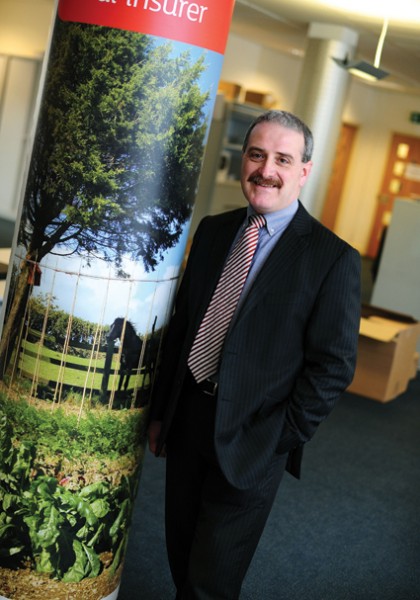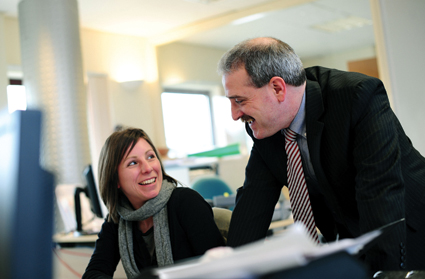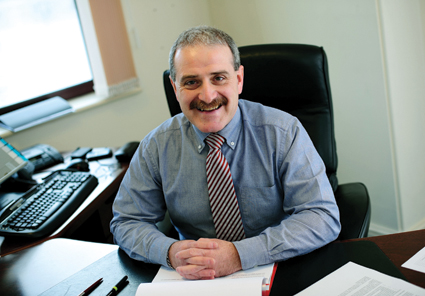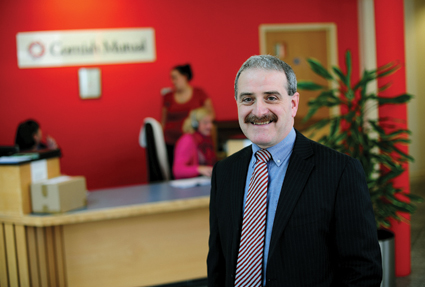Business Cornwall talks to the managing director of Cornish Mutual Alan Goddard
It might not have been the career path he originally anticipated while studying politics, philosophy and economics at Oxford University, but the Air Force’s loss has proved to be the insurance industry’s gain.
Since taking the helm at Cornish Mutual in 2004, Alan Goddard has helped further the Truro-based company’s position in the marketplace and expand its product offering.
Goddard explains the importance and pride the company takes in its mutual status, and its challenges moving forward.
He also tells us why, upon graduating, he chose the Royal Insurance Group ahead of the Royal Air Force.
Business Cornwall: How long have you been with Cornish Mutual?
Alan Goddard: I’ve been with the organisation since December 2001 and became managing director in August 2004, when my predecessor retired.
BC: Where were you before?
AG: Before joining Cornish Mutual I was at PricewaterhouseCoopers in Bristol, not in an accountancy role but in a monitoring and compliance position. Prior to that, I had spent 15 years with the Royal Insurance Group in a variety of roles.
BC: How did Cornish Mutual come along?
AG: I saw the job advertised, and I said to my wife ‘I think I could do that job, should I apply?’ Elaine said yes, and here we are. Elaine has always been very supportive in travelling around the country.
BC: This was a couple of years after Cornish Mutual had taken on its first non-agricultural clients?
AG: Yes. Until 1999 we primarily had members in the agricultural community and thatwas part of our reinsurance arrangements. That changed and we started to offer our products to the wider rural community.
BC: Was that to grow the company?
AG: Absolutely – to grow the company and to deliver a good service to a wider population. It also reflected the fact at that stage agriculture was shrinking and we were finding that a lot of our traditional members were disappearing.
BC: Has that trend steadied now?
AG: It has, although there is still consolidation taking place in the farming industry and that’s why it is important that our offering reflects the whole of the rural community and not just the farming members, although they very much remain at our core and always will be.
BC: What percentage of your customer base is non-agricultural?
AG: It’s very difficult to estimate, because so many members that have one foot in the agricultural community may not be directly involved in farming, but they may work for someone who supplies farmers.
We estimate two thirds of our business is still closely connected to the traditional agricultural community. An agricultural business is not necessarily just farmers. Contractors, people who mend machinery, provide food stuffs etc – they’re all part of the agricultural community and it’s a very close knit community.
BC: Working so closely with the agricultural sector, you must be a fairly good barometer on how the agricultural sector is faring?
AG: The agricultural sector itself has had better years recently; however, it still has difficulties. If you go back to the 1990s and early 00s there was an issue with disease problems, such as foot and mouth.
Although more recently farmers have had a better time of it, being a farmer is still daunting and there are still disease issues. Certain food prices are higher at the moment, which means they can sell their produce for more, input prices are higher as well. Farmers may be getting more for every ton of corn they sell, but the reality is that it’s costing more to produce.
BC: Do you provide cover for diseases?
AG: We provide cover for TB and Brucellosis, which a number of our members take out. We provide foot and mouth cover too, but not so many of our members take that because there are Government schemes in place. However, that is likely to change because the Government is keen to reduce the enormous cost on the public purse if it had to deal with another epidemic – it costs the tax payer an awful lot of money.
BC: Do you also insure against the bad weather? Have the recent bad winters impacted much?
AG: It has, but probably not so much on the farming community. Farmers are very resilient, entrepreneurial people and they will get on and do what needs to be done.
BC: But what about milk deliveries for example?
AG: That is one area where we’ve seen perhaps an increase in business – milk cover. The suppliers are keen that farmers carry that cover now, and we try and provide that at either inception or renewal. What we don’t want to do is take instruction from a farmer to provide cover when the snow is forecast or it’s already on the ground.
BC: Are weather patterns changing do you think, after two bad winters?
AG: If you go back two years, which is three winters ago, there were an awful lot of burst pipes in Cornwall. Where I live, out on the Roseland, it got down to minus eight – an area that very rarely gets frosts. We’ve had a lot of frosts this winter and last winter, so anecdotally it’s probably getting worse, but long-term it’s difficult to say.
Burst pipe claims cost us lots of money and lots of aggravation and stress for our members. Last year we didn’t have so many and this year fewer still. People are beginning to wake up to the fact that you’ve got take preventative measures in times of dire weather.
BC: In these tight economic times, do youfind that people and businesses sometimes under insure?
AG: It is always a challenge to get people to insure the correct risks for the correct amount, and not just in times of economic hardship, although it gets more pronounced then.
We would always encourage our members to insure for the full value at risk and if times are tough to think long and hard about perhaps which covers can be saved on. There are always ways in which premiums can be saved, perhaps by opting for a higher excess or taking a different form of cover. Our local Insurance Inspectors are in a good position to be able to talk to our members face-to-face and give them the advice they require.
BC: This individual relationship you have with members is something you pride yourselves on?
AG: Absolutely. We’re unique in that we have a field force of approximately 20 Insurance Inspectors who live and work in their local communities. From just north of Marazion to just north of Bridgwater, we’ve got someone on the ground. They understand the local community and the issues that arise. The team is made up of insurance professionals who, like the rest of the organisation, put their members first. We like to think everything we do is based on providing a member service, which is what we can do because we’re a mutual. We’re quite unique in that we are the only general insurance mutual company of this size still operating in the region.
BC: Why is this?
AG: Mutuality in the 80s and 90s took a real hammering – people thought they were inefficient and there is no doubt that some of them were. We, as a business, have to operate efficiently. Where mutuality scores highly is that we can operate to a different set of values, so it’s not all about the bottom line, we can take a wider view. We try to add value to our relationship with our members and make things better for them.
BC: Have you ever been tempted to stop being a mutual?
AG: Not in my time, no. Our members are very proud of their local insurance company. If there was a proprietary company operating a similar role to us, I suspect they would struggle to get the sort of returns their shareholders would demand, so being a mutual works very well for us, and allows us to provide the sort of service our members tell us they need.
We’re a bespoke service, we go out to our members to talk to them and can tailor the cover they need. And the final resource is what I call the ‘thump the table’ factor. Members can always come down here to Truro and bang their fist on the table and say “I want this sorted”. I am accessible and see a number of members every year at agricultural shows and when they come down here to the office, and they know if there’s an issue they can sort it out locally. It’s very difficult to do that when dealing with someone up country, or even overseas.
BC: How many members do you have roughly?
AG: We have around 21,000 members. We’re trying to increase our membership in Dorset and Somerset. The further east you go, the less our penetration is. But we want to spread the good news about Cornish Mutual to those areas.
Having people on the ground is our preferred option because that’s what seems to work. But it may be that we decide to set up a physical premise somewhere further east, we don’t know yet, that’s something we shall take a view on at some stage.
BC: What sort of turnover do you have?
AG: Our year end is September and last year we increased our turnover to around £16.5 million and our plans are to increase that up to about £25 million by 2014/15. We plan to do this by gaining more members, but by also selling more insurance to our existing members, by increasing our product range. For example, we’ll have a new household product available shortly which will give members a wider selection of covers, and we want to make changes to our motor insurance policies too.
BC: Agricultural businesses are adapting all the time, sustainable energy appearing to be particularly popular at the moment. Does this present new insurance challenges for you?
AG: We have members at the moment that already insure wind turbines and solar panels for their own use and we’re keeping a close watch on what is happening with the Feed-in Tariffs. Some of our members have spoken to us about how and whether we would insure that type of business.
We can sit down and listen to them, but its early days yet and the insurance industry is slowly edging forward on how we can provide cover on these sorts of things. We have lots of members who have diversified so we have lots of farmers who have an interest in food and drink businesses for example, others in the leisure business.
We have one farming member for instance who provides camel rides down on the Lizard. Most farmers, certainly in Cornwall, have accommodation they use as holiday lets as well. Farmers are very enterprising and resourceful people who realise they have to make the best use of their assets to make a living. It’s very unusual now for the typical Cornish farm to make their money solely from farming.
BC: What specific challenges do businesses in a rural community face?
AG: There are the challenges all businesses face wherever they are – the recession, Government spending etc, but in this part of world in particular, most companies employ people who rely on private transport to get to work, and public transport can be very poor in Cornwall.
The infrastructure here does pose some difficulties. I probably go to London about once a month on average, and in most instances it means I am away for a day because I can’t get there for a 10am meeting.
BC: Do you train or plane?
AG: I tend to go by train now. Air Southwest was quite good when it flew into London City, but Gatwick has never been that attractive to me because when I go, I’m going to the City, and now of course only Flybe fly to London with Air Southwest having pulled out.
The road network is also interesting. If we were able to dual the A30 at Temple, I think it would make such a difference. We have an office in Exeter so have staff moving back and forth fairly frequently, and when the Goss Moor situation changed, the journeys were at least 20 minutes quicker. In the summer, Cornwall can be nightmarish to get around and our Insurance Inspectors who live and work in the field have a task to plan their day to make sure they don’t get stuck in traffic.
BC: Rising fuel prices must impact regions like Cornwall more than most?
AG: Absolutely, and it’s not just transport costs but also the heating cost. Most people in this part of the world don’t have mains gas, so rely on oil or Calor gas, both of which have increased in cost dramatically.
And it’s money straight off the bottom line. Farmers have the ability to use red diesel, but the price of that has risen dramatically and that’s a classic example of an input increasing into their equation, which makes things that little bit harder.
BC: What are your views on the Cornish economy in general, and the LEP?
AG: I think its early days on that. I think my perspective would be that it needs to address the issues that are important to businesses here and some of things we’ve just spoken about, like the road infrastructure.
What is important is that we have to try and do something to keep young people in Cornwall. One of the issues we, and I suspect lots of employers in this part of the world have, is finding people who have appropriate knowledge and skills that are required. It can be hard finding people with a particular knowledge or expertise.
BC: So Cornish Mutual does a lot of its own training?
AG: We have to. But occasionally we have to bring people in to fill a particular vacancy, and that can be difficult.
BC: How many people do you employ?
AG: About 70 at the moment and the numbers probably won’t increase dramatically. We have just developed a new computer system which helps us manage our members needs more effectively and offer a wider service.
BC: What are the key challenges facing the business?
AG: Making sure that we have the appropriate people to deliver the service that our members require and to develop the products that our members want. Both those issues come down to having people on the ground. Long term we want to get to point where we develop most of our own people, but in the short term we will have to recruit people with specific skills and attract them to this part of the world and it can be difficult. It’s a beautiful place to live and work but it’s a long way from anywhere.
BC: Who is you main competition?
AG: In the agricultural sector it is NFU Mutual, and also Towergate who is a broker in these parts. For people who deal with home and motor insurance, it is the wider insurance market. Where we differ, is that we offer a local, personal service.
BC: Has the rise of supermarket insurance impacted the business?
AG: It impacts on all providers. We’ve had examples of people who have gone to those and then come back because they didn’t get the service they wanted, or bought something which didn’t turn out to be what they thought it was.
BC: Given the state of the economy, has there been much rise in fraudulent claims?
AG: An interesting question. Within the industry there has. The trouble with insurance fraud is that it’s very hard to detect, but I suspect there has been. It’s an easy option and it doesn’t help that the law doesn’t take insurance fraud as seriously as perhaps it should do.
BC: And what about other crime, such as stealing diesel? I read a story about sheep rustling recently.
AG: We’ve seen more thefts over the past 18 months than we’ve have in recent years. It does have an impact, but down here it’s nothing like what’s been going on up country.
BC: Should there be more compulsory insurance, on home insurance for example?
AG: My view would be no. Like most things, if people understand why they need to do it and what happens if they don’t, that’s where you score. Encouraging people to do it rather than force them would get a better result I suspect.
BC: What sort of percentage of people don’t insure their home?
AG: Industry figures say anywhere between 20% and 25%.
BC: Is that building or contents?
AG: That would probably be contents. There are more instances where buildings cover will exist. If you’re a tenant, it will be covered by your landlord. If you have a mortgage, the lender usually insists on it being insured. But what concerns me as an individual, is that there are potentially lots of people who don’t have liability cover. When you buy your home contents insurance you get personal liability cover so if you’re walking down the street and put up your umbrella and poke someone’s eye out, your contents insurance is likely to cover you for that situation.
BC: As a country, are we becoming increasingly litigious?
AG: We’ve seen a number of trends over the years and it’s perhaps more prevalent in motor insurance. What’s more the norm now than ever used to be is whiplash claims. We have far more whiplash claims than they do on the continent, and it’s not because the British have weaker necks than the Germans or French! It’s just because we feel it’s a way we can get some money, which is sad because at the end of the day everybody ends up having to pay increased premiums.
And it’s very difficult for the medical profession to say, ‘no, you haven’t got whiplash’ or ‘yes, that’s a definite whiplash injury’. And it’s easier to sue now, because there are people who make a living, encouraging you to make a claim, very often on a ‘no win, no fee’ basis.
BC: This can’t be good for insurance companies?
AG: Most importantly it’s not good for the end consumer, because the end consumer ends up paying for it. Insurance companies don’t manufacture money. They can only pay out in claims that they gather in premiums.
The classic example of this is that everyone in the land who has motor insurance is paying probably an extra £30 on the premium to cover the costs of claims caused by uninsured drivers. The industry is doing a lot of work to drive out uninsured driving, but you almost need to get to the situation where uninsured driving becomes as socially unacceptable as drink driving.
The public has to realise that insurers do not manufacture money, they collect premiums and pay out in claims, but they have to balance. Ours balance thankfully for our members, we make a return for our members, but it wouldn’t take much for that to disappear.
BC: A fascinating job.
AG: It is a fascinating job. People see insurance as a boring, pedestrian sort of occupation. I’ve worked in insurance for over 29 years now and it’s been varied and challenging. I’ve met lots of interesting people and I’ve had an enjoyable time. But if someone said to me at the age of 18 that’s what I would end up doing, I would have said that sounds a bit boring!
BC: What did you want to be at school?
AG: When I left school I wasn’t sure. I studied at Oxford and had this idea that I didn’t want to work in corporate industry. I thought I’d go in the Royal Air Force, I had an elder brother who had been in the Air Force, but the careers lady at the time said you ought to think about something else, have you thought about insurance? And in 1981 I was lucky to enough to be accepted by the Royal as one of 30 graduates.
BC: Quite a shift, from RAF to insurance!
AG: If I had gone into the forces it would have been a mistake, I have to say. But it’s worked out well. Lots of challenges on a day-to-day basis to keep me out of mischief!
This article first appeared in the March 2011 issue of Business Cornwall magazine.












